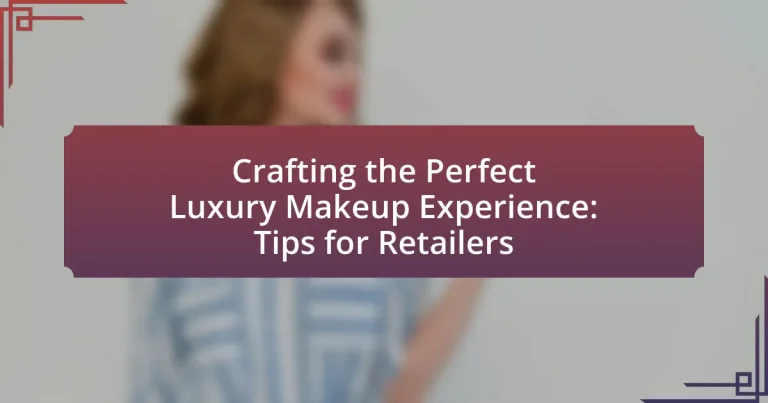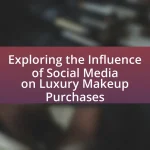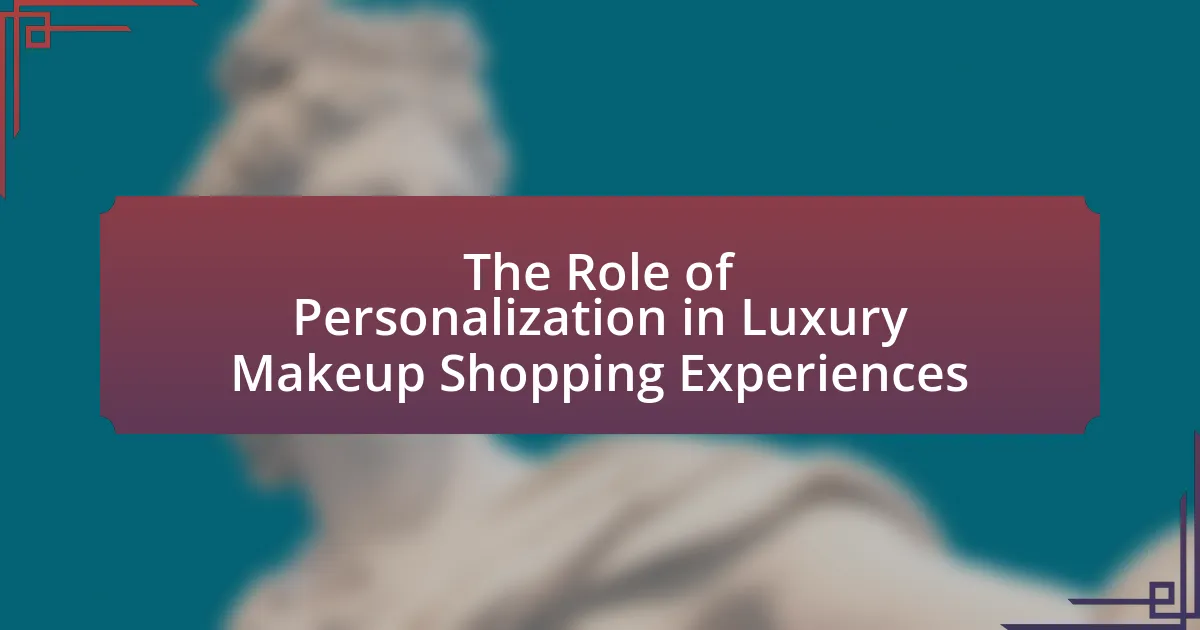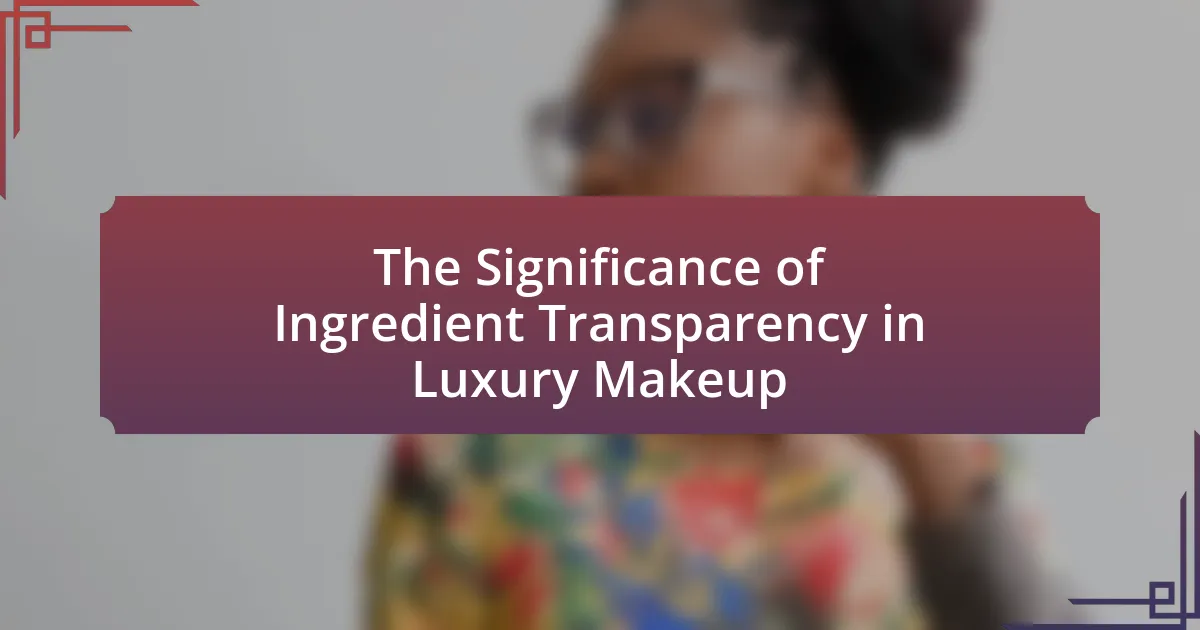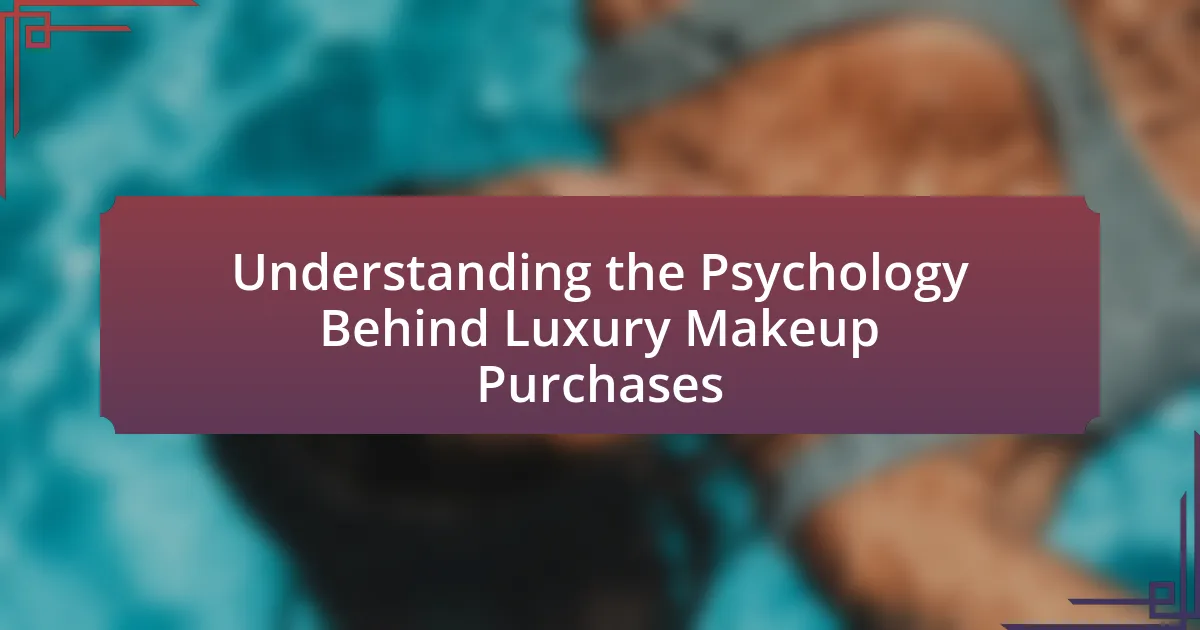The article focuses on crafting the perfect luxury makeup experience for retailers, emphasizing the importance of high-quality products, personalized service, and an exclusive shopping environment. It outlines how customer perceptions of luxury influence expectations and highlights key elements that define luxury in the makeup industry, such as premium ingredients, bespoke consultations, and brand heritage. Additionally, the article discusses the significance of ambiance, staff training, and effective marketing strategies, including the use of technology and storytelling, to enhance customer interactions and drive sales. Retailers are provided with actionable insights on overcoming challenges, justifying premium pricing, and implementing best practices to create a memorable luxury shopping experience.
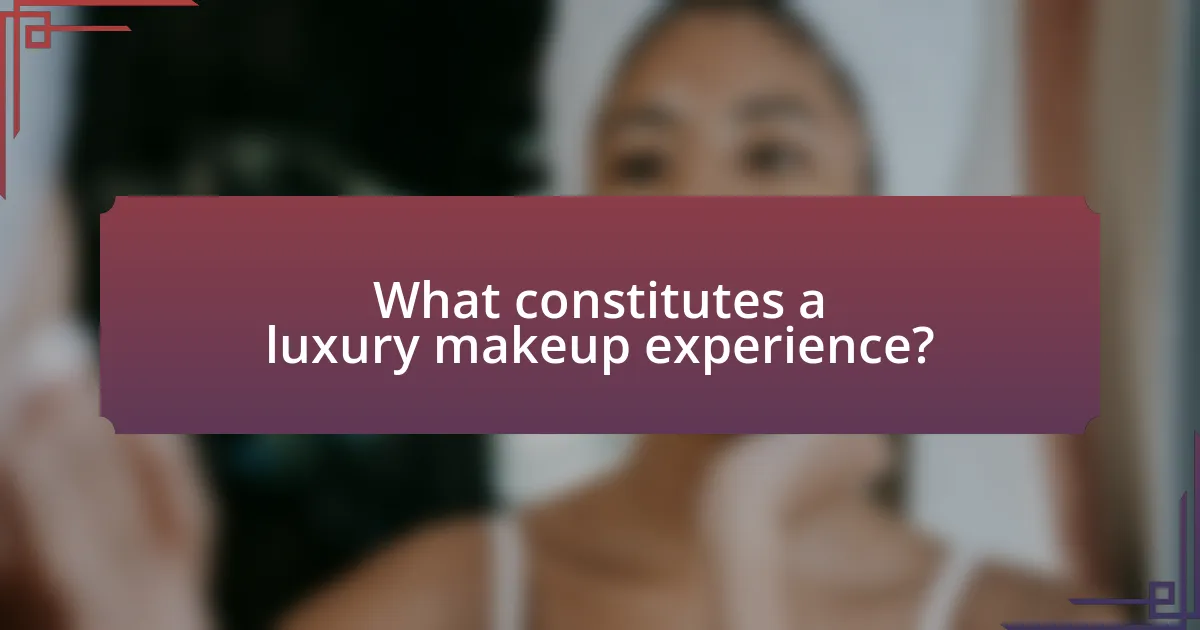
What constitutes a luxury makeup experience?
A luxury makeup experience is characterized by high-quality products, personalized service, and an exclusive environment. High-quality products often include premium ingredients and innovative formulations that enhance the user’s experience and results. Personalized service involves tailored consultations where beauty experts assess individual needs and preferences, ensuring that clients receive recommendations suited to their unique skin types and styles. An exclusive environment is created through elegant store design, attentive staff, and additional amenities such as refreshments or private spaces, which contribute to a sense of indulgence and comfort. These elements collectively elevate the overall experience, making it memorable and desirable for consumers seeking luxury in their makeup purchases.
How does the perception of luxury influence customer expectations?
The perception of luxury significantly elevates customer expectations regarding product quality, service, and overall experience. Customers associate luxury with exclusivity, superior craftsmanship, and exceptional service, leading them to anticipate a high level of attention and personalization during their shopping experience. Research indicates that luxury brands often command a premium price due to the perceived value they offer, which includes not only the product itself but also the emotional and experiential benefits tied to the brand. For instance, a study published in the Journal of Retailing found that consumers are willing to pay up to 20% more for luxury products when they believe the brand embodies prestige and status, reinforcing the idea that luxury perception directly shapes customer expectations.
What elements define luxury in the makeup industry?
Luxury in the makeup industry is defined by high-quality ingredients, exclusive packaging, personalized customer service, and brand heritage. High-quality ingredients ensure superior performance and safety, often sourced from rare or organic materials, which enhances the product’s appeal. Exclusive packaging, characterized by elegant designs and premium materials, elevates the unboxing experience and reflects the brand’s commitment to luxury. Personalized customer service, including tailored consultations and bespoke products, fosters a deeper connection with consumers, making them feel valued. Brand heritage, often rooted in a rich history or craftsmanship, adds authenticity and prestige, reinforcing the luxury status of the makeup line. Together, these elements create a compelling luxury experience that attracts discerning consumers.
How do brand values contribute to a luxury experience?
Brand values significantly enhance a luxury experience by establishing a strong emotional connection between the consumer and the brand. These values, such as quality, exclusivity, and heritage, create a perception of prestige and desirability, which are essential in the luxury market. For instance, brands like Chanel and Louis Vuitton emphasize craftsmanship and timelessness, reinforcing their status and attracting consumers who seek not just products but a lifestyle. This alignment of brand values with consumer aspirations fosters loyalty and enhances the overall luxury experience, as evidenced by studies showing that consumers are willing to pay a premium for brands that resonate with their personal values and identity.
Why is personalization important in luxury makeup retail?
Personalization is crucial in luxury makeup retail because it enhances customer satisfaction and loyalty. Tailoring products and experiences to individual preferences allows retailers to create a unique shopping experience that resonates with consumers, leading to increased sales. According to a study by McKinsey, personalized experiences can drive revenue growth by 10 to 30 percent, demonstrating the financial benefits of personalization in luxury markets. Furthermore, luxury consumers often seek exclusivity and a sense of identity, which personalization effectively provides, reinforcing brand loyalty and encouraging repeat purchases.
What are the key aspects of personalized customer service?
The key aspects of personalized customer service include understanding customer preferences, providing tailored recommendations, and fostering emotional connections. Understanding customer preferences involves gathering data on individual buying habits and feedback, which allows retailers to offer products that align with specific needs. Providing tailored recommendations enhances the shopping experience by suggesting items based on previous purchases or expressed interests, thereby increasing customer satisfaction. Fostering emotional connections is crucial, as it builds trust and loyalty; studies show that customers are more likely to return to brands that make them feel valued and understood.
How can retailers effectively gather customer preferences?
Retailers can effectively gather customer preferences by utilizing surveys, loyalty programs, and data analytics. Surveys allow retailers to directly ask customers about their preferences, providing valuable insights into their needs and desires. Loyalty programs incentivize customers to share their preferences in exchange for rewards, creating a mutually beneficial relationship. Data analytics enables retailers to analyze purchasing patterns and behaviors, revealing trends and preferences without direct customer input. According to a study by McKinsey, companies that leverage customer data effectively can increase their sales by 10-20%, demonstrating the importance of understanding customer preferences in driving business success.
What role does ambiance play in creating a luxury makeup experience?
Ambiance plays a crucial role in creating a luxury makeup experience by influencing customer emotions and perceptions. A well-designed ambiance, characterized by elements such as lighting, scent, and decor, enhances the overall shopping experience, making it feel exclusive and indulgent. Research indicates that environments with soft lighting and pleasant scents can increase customer satisfaction and spending, as they evoke feelings of comfort and luxury. For instance, a study published in the Journal of Retailing found that atmospheric factors significantly impact consumer behavior, leading to longer dwell times and increased purchase intentions in luxury retail settings. Thus, the right ambiance not only attracts customers but also reinforces the luxury brand image, ultimately driving sales.
How can store layout enhance the luxury feel?
Store layout can enhance the luxury feel by creating an inviting and spacious environment that encourages exploration and engagement. A well-designed layout often incorporates high-quality materials, strategic lighting, and thoughtful product placement, which collectively contribute to an upscale atmosphere. For instance, luxury retailers frequently utilize open spaces and minimalistic designs to avoid clutter, allowing customers to focus on premium products. Research indicates that consumers perceive luxury brands more favorably when they experience a store environment that reflects sophistication and exclusivity, as seen in studies on retail atmospherics.
What sensory elements should be considered in luxury retail environments?
Luxury retail environments should consider visual, auditory, olfactory, tactile, and gustatory sensory elements. Visual elements include elegant displays and lighting that enhance product appeal, while auditory elements involve curated music that creates an inviting atmosphere. Olfactory elements, such as signature scents, can evoke emotions and enhance brand identity. Tactile elements, like high-quality materials and textures, encourage customers to engage with products. Finally, incorporating gustatory elements, such as offering refreshments, can elevate the overall shopping experience. Research indicates that sensory marketing significantly influences consumer behavior, enhancing brand perception and customer satisfaction.
How can retailers train staff to deliver a luxury experience?
Retailers can train staff to deliver a luxury experience by implementing comprehensive training programs focused on product knowledge, customer service excellence, and personalized interactions. These programs should include in-depth education about luxury products, emphasizing their unique qualities and benefits, which enables staff to convey expertise and confidence to customers. Additionally, role-playing scenarios can enhance customer service skills, allowing staff to practice handling various customer interactions with poise and professionalism. Research indicates that 70% of customers are willing to pay more for a better experience, highlighting the importance of effective training in creating memorable luxury shopping experiences.
What skills are essential for staff in luxury makeup retail?
Essential skills for staff in luxury makeup retail include exceptional customer service, in-depth product knowledge, and strong communication abilities. Exceptional customer service is crucial as it enhances the shopping experience, fostering customer loyalty and satisfaction. In-depth product knowledge allows staff to provide tailored recommendations, ensuring customers find products that meet their specific needs. Strong communication abilities enable staff to engage effectively with clients, building rapport and trust. These skills collectively contribute to creating a memorable luxury shopping experience, which is vital in the competitive luxury makeup market.
How can ongoing training improve customer interactions?
Ongoing training enhances customer interactions by equipping employees with the latest product knowledge and customer service skills. This continuous education enables staff to provide personalized recommendations, address customer inquiries effectively, and create a more engaging shopping experience. Research indicates that companies investing in employee training see a 24% increase in customer satisfaction scores, demonstrating the direct correlation between well-trained staff and positive customer interactions.
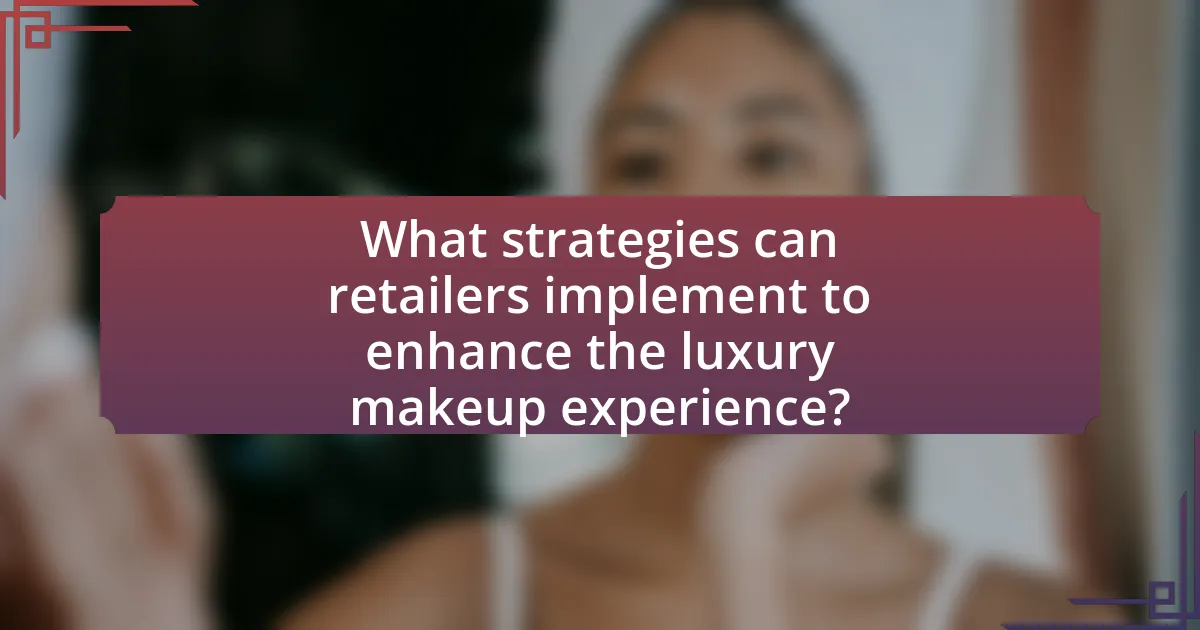
What strategies can retailers implement to enhance the luxury makeup experience?
Retailers can enhance the luxury makeup experience by offering personalized consultations and exclusive product offerings. Personalized consultations allow customers to receive tailored advice and product recommendations, which can increase customer satisfaction and loyalty. For instance, brands like Chanel and Dior provide one-on-one sessions with beauty experts, creating a bespoke shopping experience that resonates with luxury consumers. Additionally, exclusive product offerings, such as limited-edition collections or collaborations with renowned makeup artists, can create a sense of urgency and desirability, encouraging purchases. According to a study by Bain & Company, the luxury beauty market is projected to grow significantly, indicating that retailers who invest in these strategies can capitalize on this expanding market.
How can exclusive product offerings elevate the shopping experience?
Exclusive product offerings can elevate the shopping experience by creating a sense of uniqueness and desirability among consumers. When retailers provide exclusive items, they tap into the psychological principle of scarcity, which increases perceived value and urgency to purchase. For instance, a study published in the Journal of Consumer Research found that limited-edition products can lead to higher consumer interest and willingness to pay, as customers feel they are part of an exclusive group. This exclusivity not only enhances customer satisfaction but also fosters brand loyalty, as consumers are more likely to return to a retailer that offers unique products that cannot be found elsewhere.
What types of exclusive products attract luxury consumers?
Luxury consumers are attracted to exclusive products such as limited-edition cosmetics, high-end skincare lines, and bespoke fragrance collections. These products often feature unique formulations, premium packaging, and collaborations with renowned artists or designers, enhancing their desirability. For instance, brands like Chanel and Tom Ford frequently release limited-edition makeup collections that create a sense of urgency and exclusivity, driving demand among affluent buyers. Additionally, luxury consumers value personalized experiences, which can include custom makeup consultations or tailored skincare regimens, further solidifying their connection to exclusive products.
How can limited editions create urgency and desirability?
Limited editions create urgency and desirability by offering consumers a unique opportunity to acquire exclusive products that are available for a limited time. This scarcity triggers a fear of missing out (FOMO), compelling customers to act quickly to secure their purchase before the items are sold out. Research indicates that limited availability can increase perceived value; for instance, a study published in the Journal of Consumer Research found that consumers are more likely to desire products that are scarce, as they associate rarity with higher quality. Additionally, brands often leverage marketing strategies that emphasize the exclusivity of limited editions, further enhancing their appeal and driving demand.
What marketing techniques are effective for luxury makeup brands?
Effective marketing techniques for luxury makeup brands include influencer partnerships, exclusive product launches, and personalized customer experiences. Influencer partnerships leverage the credibility and reach of beauty influencers to create authentic connections with potential customers, driving brand awareness and sales. Exclusive product launches generate excitement and urgency, often leading to increased demand and higher sales volumes, as seen with brands like Chanel and Dior, which frequently release limited-edition collections. Personalized customer experiences, such as tailored recommendations and bespoke services, enhance customer loyalty and satisfaction, as evidenced by brands like Estée Lauder, which utilize data analytics to customize marketing efforts. These techniques collectively contribute to a strong brand image and customer engagement in the luxury makeup sector.
How can storytelling enhance brand perception?
Storytelling enhances brand perception by creating emotional connections between consumers and the brand. When brands share compelling narratives, they engage customers on a deeper level, fostering loyalty and trust. Research indicates that 92% of consumers prefer ads that feel like a story, highlighting the effectiveness of storytelling in marketing. Additionally, brands that effectively utilize storytelling can differentiate themselves in a crowded market, as narratives help convey unique brand values and identity. This approach not only captures attention but also encourages consumers to remember and share the brand’s message, ultimately leading to a more favorable perception.
What role do social media and influencers play in luxury marketing?
Social media and influencers play a crucial role in luxury marketing by enhancing brand visibility and shaping consumer perceptions. Luxury brands leverage platforms like Instagram and TikTok to showcase their products through visually appealing content, which resonates with target audiences. Influencers, often seen as trusted figures, amplify this effect by endorsing luxury products, thereby creating a sense of aspiration and exclusivity. According to a 2021 study by McKinsey, 70% of consumers reported that social media influences their purchasing decisions, particularly in the luxury sector, where brand image and social proof are paramount. This synergy between social media and influencers effectively drives engagement and sales for luxury brands.
How can retailers utilize technology to improve the luxury experience?
Retailers can utilize technology to improve the luxury experience by implementing personalized customer engagement tools, such as AI-driven recommendations and virtual try-on features. These technologies enhance the shopping experience by allowing customers to receive tailored product suggestions based on their preferences and past purchases, which has been shown to increase customer satisfaction and loyalty. For instance, a study by McKinsey & Company found that personalization can lead to a 10-30% increase in revenue for retailers. Additionally, augmented reality (AR) applications enable customers to visualize how luxury makeup products will look on them before making a purchase, thereby reducing uncertainty and enhancing the overall shopping experience.
What are the benefits of virtual try-on technology?
Virtual try-on technology offers significant benefits, including enhanced customer engagement and improved purchasing confidence. By allowing consumers to visualize how products will look on them in real-time, this technology reduces the uncertainty often associated with online shopping. Studies indicate that brands utilizing virtual try-on solutions can see up to a 200% increase in conversion rates, as customers feel more assured in their choices. Additionally, virtual try-on technology can decrease return rates, as customers are more likely to select products that match their preferences accurately. This technology not only enhances the shopping experience but also drives sales and customer satisfaction in the luxury makeup sector.
How can data analytics personalize customer interactions?
Data analytics can personalize customer interactions by analyzing individual customer data to tailor experiences and recommendations. Retailers can utilize data such as purchase history, browsing behavior, and demographic information to create customized marketing messages and product suggestions. For instance, a study by McKinsey & Company found that personalized recommendations can lead to a 10-30% increase in sales, demonstrating the effectiveness of data-driven personalization in enhancing customer engagement and satisfaction.
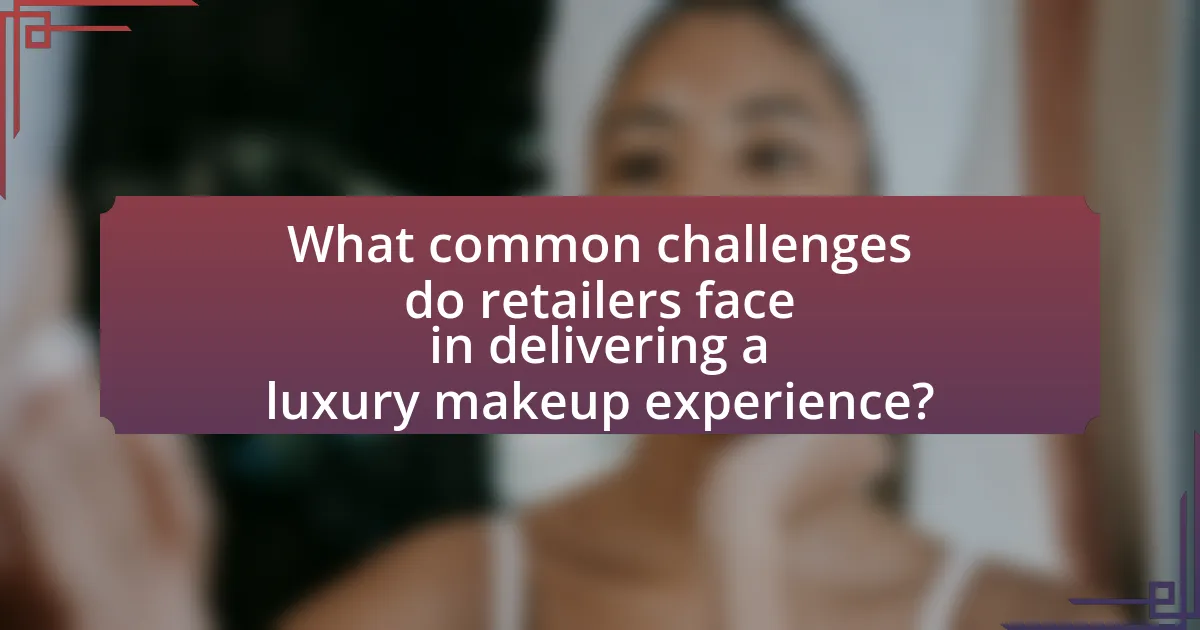
What common challenges do retailers face in delivering a luxury makeup experience?
Retailers face several common challenges in delivering a luxury makeup experience, including maintaining product exclusivity, ensuring high-quality customer service, and managing inventory effectively. Product exclusivity is crucial, as luxury brands often limit availability to enhance desirability; however, this can lead to stock shortages that frustrate customers. High-quality customer service is essential in luxury retail, yet training staff to meet the elevated expectations of luxury consumers can be resource-intensive and costly. Additionally, managing inventory poses a challenge, as retailers must balance having enough stock to meet demand without overstocking, which can dilute the brand’s luxury image. These challenges require strategic planning and execution to successfully create a luxury shopping experience.
How can retailers overcome pricing objections in luxury makeup sales?
Retailers can overcome pricing objections in luxury makeup sales by emphasizing the quality and exclusivity of their products. Highlighting the use of premium ingredients, unique formulations, and the artistry involved in creating luxury makeup can justify higher price points. For instance, studies show that consumers are willing to pay more for products that are perceived as high-quality and exclusive, as they associate these attributes with enhanced performance and status. Additionally, offering personalized consultations and experiences can create a sense of value that mitigates price concerns, as customers feel they are receiving tailored service that enhances their overall shopping experience.
What strategies can be used to justify premium pricing?
To justify premium pricing, retailers can employ strategies such as emphasizing product quality, leveraging brand prestige, and offering exceptional customer service. High-quality ingredients and unique formulations can differentiate products, making them more desirable and justifying higher prices. For instance, luxury makeup brands often use rare or innovative components that enhance performance, which consumers are willing to pay more for.
Additionally, brand prestige plays a crucial role; established luxury brands like Chanel or Dior command higher prices due to their reputation and heritage, which consumers associate with exclusivity and status. This perception can be supported by marketing campaigns that highlight the brand’s history and craftsmanship.
Exceptional customer service, including personalized consultations and exclusive experiences, further enhances the perceived value of premium products. Research indicates that consumers are more likely to pay higher prices when they feel valued and receive tailored experiences, as seen in luxury retail environments where customer engagement is prioritized.
How can retailers communicate value effectively to customers?
Retailers can communicate value effectively to customers by clearly articulating the unique benefits and quality of their products. This involves highlighting features such as premium ingredients, exclusive formulations, and the overall luxury experience associated with the makeup. For instance, studies show that 70% of consumers are willing to pay more for products that emphasize quality and exclusivity. By utilizing storytelling techniques in marketing, showcasing customer testimonials, and providing detailed product information, retailers can reinforce the perceived value and justify the price point, ultimately enhancing customer trust and loyalty.
What are the pitfalls to avoid in luxury makeup retailing?
In luxury makeup retailing, pitfalls to avoid include neglecting customer experience, failing to train staff adequately, and underestimating the importance of brand storytelling. Neglecting customer experience can lead to dissatisfaction, as luxury consumers expect personalized service and high-quality interactions. Research shows that 70% of buying experiences are based on how customers feel they are being treated. Inadequate staff training can result in poor product knowledge and customer service, which diminishes the luxury experience; a study by the National Retail Federation indicates that knowledgeable staff can increase sales by up to 20%. Lastly, underestimating brand storytelling can weaken emotional connections with consumers, as effective storytelling is crucial in luxury markets where brand heritage and values significantly influence purchasing decisions.
How can poor customer service damage a luxury brand’s reputation?
Poor customer service can significantly damage a luxury brand’s reputation by undermining the perceived value and exclusivity that such brands strive to maintain. Luxury brands rely on exceptional customer experiences to differentiate themselves in a competitive market; when service fails, it leads to negative customer perceptions and dissatisfaction. For instance, a study by Bain & Company found that a 10% increase in customer satisfaction can lead to a 5-10% increase in revenue, highlighting the direct correlation between service quality and brand success. Negative experiences can spread rapidly through social media and online reviews, amplifying the damage and leading to a loss of trust among potential customers.
What mistakes should retailers avoid in product presentation?
Retailers should avoid cluttered displays in product presentation. Clutter can overwhelm customers and detract from the luxury experience, making it difficult for them to focus on individual products. Research indicates that well-organized displays can increase sales by up to 30%, as customers are more likely to engage with products that are presented clearly and attractively. Additionally, failing to highlight key products or features can lead to missed sales opportunities, as customers may overlook items that are not prominently displayed.
What best practices can retailers adopt for a successful luxury makeup experience?
Retailers can adopt personalized customer service as a best practice for a successful luxury makeup experience. This involves training staff to provide tailored consultations that address individual customer needs and preferences, enhancing the overall shopping experience. Research indicates that 80% of consumers are more likely to make a purchase when offered personalized experiences, highlighting the importance of this approach in luxury retail. Additionally, creating an inviting and aesthetically pleasing store environment can further elevate the luxury experience, as studies show that a well-designed space can increase customer satisfaction and dwell time.
How can feedback be effectively used to improve the luxury experience?
Feedback can be effectively used to improve the luxury experience by systematically collecting and analyzing customer insights to tailor services and products. Retailers can implement structured feedback mechanisms, such as post-purchase surveys and in-store interviews, to gather specific data on customer preferences and pain points. For instance, a study by Bain & Company found that companies that actively seek customer feedback can increase customer satisfaction by up to 20%. By utilizing this feedback, luxury brands can refine their offerings, enhance personalized services, and create a more memorable shopping experience, ultimately leading to increased customer loyalty and higher sales.
What are the key takeaways for retailers aiming to enhance luxury makeup experiences?
Retailers aiming to enhance luxury makeup experiences should prioritize personalized customer service, high-quality product offerings, and immersive shopping environments. Personalized service, such as tailored consultations and exclusive product recommendations, fosters customer loyalty and satisfaction. High-quality products, including premium ingredients and innovative formulations, attract discerning consumers who seek value in luxury. Additionally, creating immersive environments through elegant store design and engaging sensory experiences can elevate the shopping journey, making it memorable and enjoyable. These strategies are supported by research indicating that personalized experiences can increase customer retention by up to 80%, while immersive environments can enhance brand perception and customer engagement.
